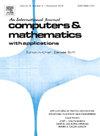热耦合不可压缩IMHD系统解耦线性无条件稳定电荷保守有限元格式的最优误差估计
IF 2.5
2区 数学
Q1 MATHEMATICS, APPLIED
引用次数: 0
摘要
我们开发并分析了一个解耦、线性、无条件稳定、电荷保守的热耦合不可压缩无感应磁流体动力学(IMHD)系统的全离散格式。由于系统的非线性和耦合性,开发一种解耦且实际有效的方案一直是一个具有挑战性的问题。我们通过用反向欧拉方法离散时间变量,用隐式显式(IMEX)技术线性化非线性对流项并解耦速度、电流密度和温度,以及用压力投影法解耦速度和压力来克服这一困难。利用有限元方法对空间变量进行离散,得到了较高的精度。值得注意的是,该方案易于实现,因为它只需要在每个时间步求解一个线性子系统。此外,它是无条件稳定的,并直接产生精确的散度自由电流密度。通过引入各种有限元投影和开发新颖的归纳推理技术,我们获得了速度、温度、电流密度、压力和电势的最佳L2误差估计。通过数值实验验证了该方法的精度和电荷守恒性。本文章由计算机程序翻译,如有差异,请以英文原文为准。
Optimal error estimates of a decoupled, linear, unconditionally stable and charge-conservative finite element scheme for a thermally coupled incompressible IMHD system
We develop and analyze a decoupled, linear, unconditionally stable, charge-conservative fully discrete scheme for a thermally coupled incompressible inductionless magneto-hydrodynamics (IMHD) system. Due to the nonlinearity and coupling of the system, developing a decoupled and practically effective scheme has always been a challenging problem. We overcome the difficulty by discretizing the temporal variables with the backward Euler method, linearizing the nonlinear convection term and decoupling the velocity, current density and temperature with implicit-explicit (IMEX) techniques, as well as decoupling the velocity and pressure with pressure-projection method. By discretizing the spatial variables with the finite element method, we acquire high accuracy. It is worth noting that the scheme is easy to implement since it requires solving merely a linear subsystem at each time step. Moreover, it is unconditionally stable, and yields an exactly divergence free current density directly. By introducing various finite element projections and developing novel inductive reasoning techniques, we gain optimal error estimates for the velocity, temperature, current density, pressure and electric potential. Numerical tests are provided to verify the good performance of the scheme such as the accuracy and charge conservation.
求助全文
通过发布文献求助,成功后即可免费获取论文全文。
去求助
来源期刊

Computers & Mathematics with Applications
工程技术-计算机:跨学科应用
CiteScore
5.10
自引率
10.30%
发文量
396
审稿时长
9.9 weeks
期刊介绍:
Computers & Mathematics with Applications provides a medium of exchange for those engaged in fields contributing to building successful simulations for science and engineering using Partial Differential Equations (PDEs).
 求助内容:
求助内容: 应助结果提醒方式:
应助结果提醒方式:


